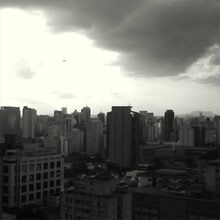Dossier: Brazil
Editors' Note
Contributors
Panic Twice in the City
“São Paulo is a dead city. The populace is alarmed; faces register panic and apprehension because everything is closed, without the slightest movement. Besides a few scurrying pedestrians, only military vehicles occupy the streets. Troops armed with rifles and machine guns have orders to fire at anyone who remains on the street.” This city emptied by fear isn’t the 21st -century megalopolis that hid behind the barricades on the night of the 15th of May, 2006; but a still-provincial city, recently industrialized, paralyzed by a general strike in July 1917.
Worries of a Family Man
Roberto Schwarz’s 1966 reading reveals the social content of a famously elusive text by Franz Kafka, and hints at its hidden affinities with both the historical moment of Schwarz’s reading and with our own present.
The Relevance of Brecht: High Points and Low
On one hand, the main thrust of Brecht’s dramaturgy seems almost beside the point in an age of cynical reason. What critical edge can we ascribe to the estrangement effect when Brechtian techniques are used to sell kitchen sponges on TV? On the other hand, a contemporary performance of Saint Joan of the Stockyards speaks clearly to our age, not just to a bygone era of monopoly capital and liberal sincerity. Have we been missing something in Brecht that explains the paradox?
Reflections on Theater in a Time of Barbarism
A veteran of the São Paulo theater scene reflects on the practice and theory of independent theater groups in a period of social disintegration.
The Lenin Moment
After tracing the path taken by the Partido dos Trabalhadores (Workers’ Party) to the Presidency of Brazil, Francisco de Oliveira describes how the first years of the PT adminstration, which continued on the same footing as the previous government, relate to a broader context characterized by the consequences of the ascendancy of finance capital: the impossibility of hegemony due to the increasing chasm between rich and poor; the decomposition of class bases, including that of the bourgeoisie due to the antagonism between financial and industrial capital; emergent populism; and finally the incorporation of parties and politics into the State, even as the economy and daily life are increasingly privatized.
Brazil in the South Atlantic: 1550-1850
The history of modern Brazil has always been interpreted on the basis of one central question or another: cattle raising in the Valley of São Francisco, the relations between masters and slaves, the structures of dependency generated by merchant capital, bureaucratic privilege or the stakes of the gold economy in the 18th Century. New research on the slave trade, on the subjugation of the Indians, on internal and international migrations, allows for the elaboration of an interpretive axis of wider scope: the transformations of labor in the colonial and national context through the middle of the 19th century. These transformations inscribe themselves in a larger space that conditions the history of Portuguese America and Brazil from 1550 to 1850: the South Atlantic. This horizon imposes a new periodization. The rupture with the colonial order occurred not with the arrival of the Portuguese court in 1808 or with independence in 1822, but in 1850, with the definitive end of the African slave trade.
Book Reviews
Our Lot
Milton Ohata reviews Roberto Schwarz’s Seqüências Brasileiras [Brazilian Episodes]. After the important pamphlet Duas meninas [Two Girls] (1997), Roberto Schwarz returns to the scene with Seqüências Brasileiras, which brings together writings published from 1988-1998. His essays, enemies of preestablished hierarchies, unashamed before mythologies and fashions — always explosive, though discreet — tend to risk untravelled roads, passing by the techniques and fashions common among specialists.
Brazilian Civilization's Missing Link
Milton Ohata reviews Luiz Felipe de Alencastro’s O trato dos viventes: Formação do Brasil no Atlântico Sul [Mortal Traffic: The Formation of Brazil in the South Atlantic]. O trato dos viventes begins from a simple but consequential premise: that in the history of Portuguese America, the whole is not the sum of its parts; that is, it cannot be understood by merely combining the histories of its various regimes. Rather, local history is to be interpreted in the light of its effective connections, in reciprocal determination, with the history of capitalism — in which the slave trade played an indispensible part.
